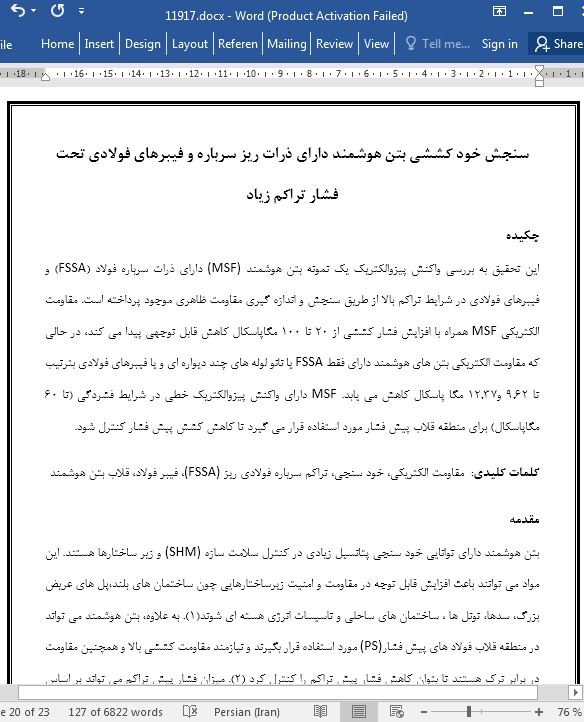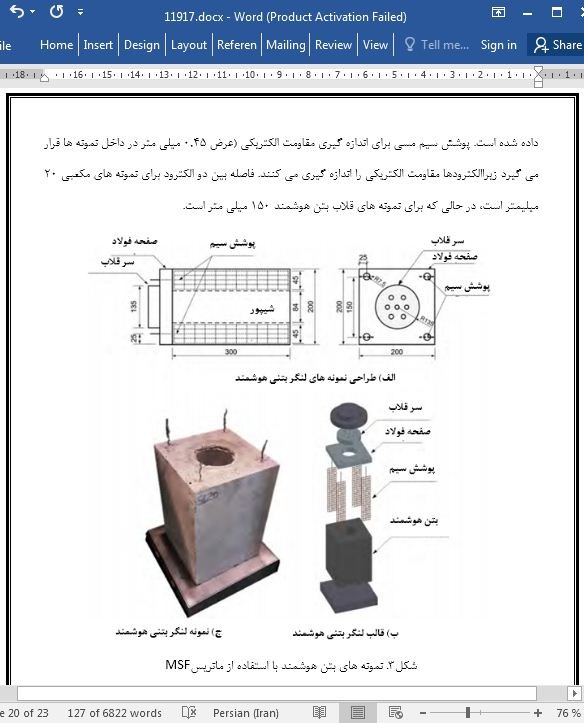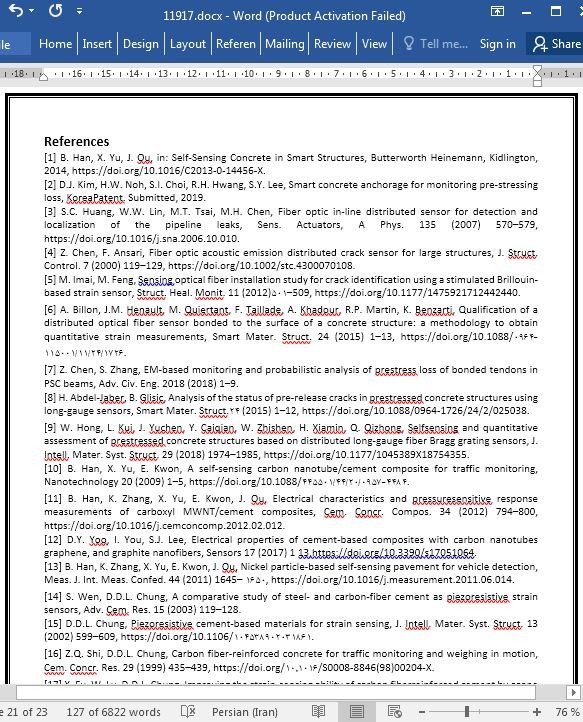
سنجش خود کششی بتن هوشمند دارای ذرات ریز سرباره و فیبرهای فولادی تحت فشار تراکم زیاد
چکیده
این تحقیق به بررسی واکنش پیزوالکتریک یک نمونه بتن هوشمند (MSF) دارای ذرات سرباره فولاد (FSSA) و فیبرهای فولادی در شرایط تراکم بالا از طریق سنجش و اندازه گیری مقاومت ظاهری موجود پرداخته است. مقاومت الکتریکی MSF همراه با افزایش فشار کششی از 20 تا 100 مگاپاسکال کاهش قابل توجهی پیدا می کند، در حالی که مقاومت الکتریکی بتن های هوشمند دارای فقط FSSA یا نانو لوله های چند دیواره ای و یا فیبرهای فولادی بترتیب تا 9.62 و12.37 مگا پاسکال کاهش می یابد. MSF دارای واکنش پیزوالکتریک خطی در شرایط فشردگی (تا 60 مگاپاسکال) برای منطقه قلاب پیش فشار مورد استفاده قرار می گیرد تا کاهش کشش پیش فشار کنترل شود.
مقدمه
بتن هوشمند دارای توانایی خود سنجی پتانسیل زیادی در کنترل سلامت سازه (SHM) و زیر ساختارها هستند. این مواد می توانند باعث افزایش قابل توجه در مقاومت و امنیت زیرساختارهایی چون ساختمان های بلند،پل های عریض بزرگ، سدها، تونل ها ، ساختمان های ساحلی و تاسیسات انرژی هسته ای شوند(1). به علاوه، بتن هوشمند می تواند در منطقه قلاب فولاد های پیش فشار(PS) مورد استفاده قرار بگیرند و نیازمند مقاومت کششی بالا و همچنین مقاومت در برابر ترک هستند تا بتوان کاهش فشار پیش تراکم را کنترل کرد (2). میزان فشار پیش تراکم می تواند بر اساس واکنش الکتروحرارتی بتن هوشمند در منطقه قلاب PS کنترل شود.
5.نتیجه گیری ها
در تحقیق تجربی انجام شده، توانایی خود کششی یک نمونه بتن هوشمند (با مقاومت کششی 184 Mpa) دارای FSSA (توپ شکل با حداکثر 0.39 میلی متر) و فیبرهای فولادی (با طول 6 میلی متر و قطر 0.2 میلی متر) با اندازه گیری AC همراه با دو PROBE بررسی شده است. واکنش پیزوالکتریک بتن هوشمند دارای FSSA و فیبرهای فولادی (MFS) با واکنش بتن های هوشمند دارای فقی فیبرهای فولاد (MF) – فقط FSSA (MS) و هر دو ماده MWCNT و فیبرهای فولادی (MFMW) مقایسه شده اند. توانایی خود کششی برای MSF در منطقه قطبی قولاد پیش فشرده شده (PS) مورد استفاده قرار گرفته است تا افت فشار کنترل شود. به علاوه، تاثیرات دما و رطوبت بر مقاومت الکتریکی بتن هوشمند مورد بررسی قرار گرفته اند.
Abstract
This study investigated the piezoelectric response of a smart concrete (MSF) containing fine steel slag aggregates (FSSAs) and steel fibers under high compression by measuring the alternative current impedance. The electrical resistivity of MSF notably decreased (15.65%) with the increase in the applied compressive stress from 20 to 100 MPa, whereas the electrical resistivities of smart concretes containing only FSSAs or steel fibers or both multiwalled carbon nanotubes and steel fibers reduced by 9.62, 12.37, and 9.30%, respectively. The MSF with a linear piezoelectric response under compression (until 60 MPa) was applied to a prestressing steel anchorage zone to monitor the loss of prestressing stress.
1. Introduction
Smart concretes with a self-sensing ability have great potential in the field of structural health monitoring (SHM) for infrastructures. They can significantly enhance the durability and safety of infrastructures such as high-rise buildings, large span bridges, dams, tunnels, offshore structures, and nuclear power plants [1]. Furthermore, smart concrete can be applied to prestressing steel (PS) anchorage zone, requiring a high compressive strength as well as crack resistance, to monitor the loss of prestressing stress [2]. The level of prestressing stress can be monitored based on the electromechanical response of the smart concrete in the PS anchorage zone [2].
5. Conclusions
This experimental study investigated the self-stress sensing ability of a smart concrete (with a compressive strength of 184 MPa) containing FSSAs (ball shaped, with a maximum diameter of 0.39 mm) and steel fibers (with a length of 6 mm and a diameter of 0.2 mm) under compression using AC measurement with two probes. The piezoelectric response of a smart concrete containing FSSAs and steel fibers (MSF) was compared with that of smart concretes containing only steel fibers (MF), only FSSAs (MS), and both steel fibers and MWCNT (MFMW). The self-stress sensing ability of the MSF was utilized in a prestressing steel (PS) anchorage zone to monitor the loss of prestressing stress. In addition, the effects of temperature and humidity on the electrical resistivity of the smart concrete were investigated.
چکیده
1 مقدمه
2 بتن های هوشمند و اندازه گیری مقاومت AC
3 تجربی
3.1 مواد و آماده سازی نمونه ها
3.2 موقعیت آزمایش
4 نتایج و بحث
4.1 واکنش های الکتریکی قیاسی
4.2 قابلیت سنجش خود کششی قلاب بین هوشمند ساخته شده از MSF
4.3تاثیرات دما و رطوبت بر مقاومت الکتریکی MSF
5 نتیجه گیری ها
منابع
Abstract
1. Introduction
2. Smart concretes and AC impedance measurement
3. Experimental
3.1. Materials and specimen preparation
3.2. Test setup
4. Results and discussion
4.1. Comparative electrical responses
4.2. Self-stress sensing capacity of smart concrete anchorage made from MSF
4.3. Effects of temperature and humidity on the electrical resistivity of MSF
5. Conclusions
Declaration of Competing Interest
Acknowledgments
References
- اصل مقاله انگلیسی با فرمت ورد (word) با قابلیت ویرایش
- ترجمه فارسی مقاله با فرمت ورد (word) با قابلیت ویرایش، بدون آرم سایت ای ترجمه
- ترجمه فارسی مقاله با فرمت pdf، بدون آرم سایت ای ترجمه



